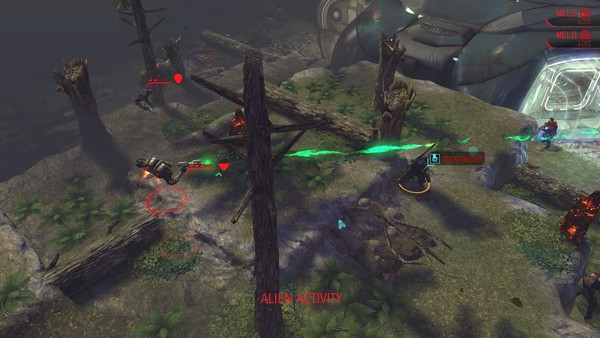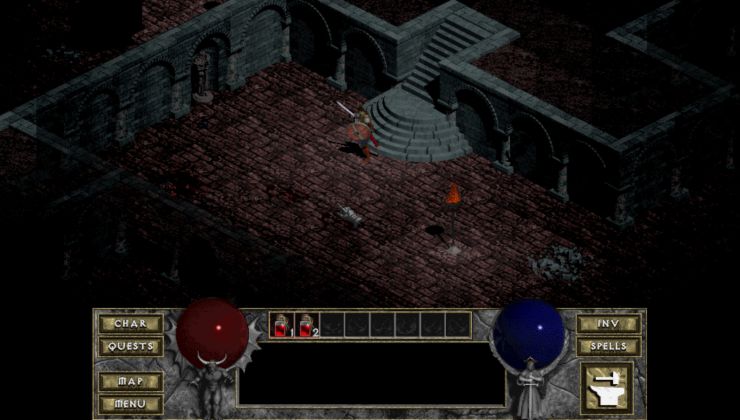Recently, GOG added the Windows version of XCOM: Enemy Unknown to their store and since it has a Linux version on Steam, I reached out to the porter to see about their plans for the Linux version.

We've seen a lot of speculation in the past, with people wondering if Feral Interactive will ever get their Linux ports onto a store other than Steam. Here's their official stance, which they sent me this morning:
We don't have any plans to distribute our games through GoG. If this changes, we'll make announcements through our usual channels.
We can speculate all we like as to why they're not doing it, even if the decision does strike me as a little odd. Hopefully they will reevaluate this stance in future, considering it's not exactly a new game and the Linux port from 2014 isn't exactly new either.
A shame for everyone who prefers their games on GOG.
I am a little upset too knowing that Torchlight 1 for Linux is available on GOG but not on Steam - but that's just one single game.
Torchlight 1 is not available for Linux on GOG either.
1. Feral has decided to not put any more of their ports on GOG. They did not say why.
2. Shmerl has superpowers that lets him/her read the minds of the employees of Feral.
3. Using this superpower, Shmerl has determined that the sole, solitary reason for Feral's decision is that they're married to the idea of DRM. No other reason. At all. The rest of us who conjectured other possibilities are just plain wrong, for we do not possess the same superpowers as Shmerl and could not possibly understand the burden this superpower places upon him/her.
4. This discussion was always about DRM and how evil it is. Why, just look at the title of the article! Oh wait...
Anyway, DRM is one thing, but how about the fact you're running proprietary code you don't know what's doing even if you use GOG. If you're gonna be a hardliner, do it properly.
Ding ding ding ding ding ding!
--------------------- END OF DISCUSSION, CUT HERE ---------------------
Last edited by Ryblade on 20 Jun 2018 at 2:00 pm UTC
No other reason. At all.
Does it matter what other reason there is? They still left DRM-free users out. Ding ding ding, but you clearly don't think it matters, since you are OK with DRM apparently :)
Last edited by Shmerl on 20 Jun 2018 at 2:31 pm UTC
Or reading the same book dozens of times.
I do this all the time. I've read Lord of the Rings at least a dozen times. And I do it for the same reason I replay games.
I'm not very patient. When I read a book, or play a video game, I always start out planning to experience it all. Inevitably, I get impatient, I skim what I'm reading. I ignore side quests or speed through things. I get to the point where I'm speeding to the end.
Then, I play / read it again, and pick up more of what I missed the first time around. And again. And if I really like it, again and again and again.
To me, replaying a game despite it not offering anything new would be like visiting the same holiday location every year. Or reading the same book dozens of times. What's the point? What new knowledge or skill is being gained?To be honest I don't go on holidays either, and I find those that do often only get a very shallow understanding of the places they end up travelling to, just as a how a lot of people only seem to gain a shallow appreciation for the games they play. For me there is no argument; games are art, and art is not something I feel comfortable engaging with once and then throwing in a bin.
Why would you replay a game that doesn't even offer replayability?I don't, it is just that I seem to find more value in the games that I play than you do.
If you know the story, you know everything that will be coming, there will be nothing surprising or interesting.Good writing can always be appreciated and reevaluated. Even bad writing can be fun to learn from.
If you have beaten the game, there will not be any new challenges to put yourself against.That is not really true for a start, as there is almost always more then one way to approach a challenge in a game, but again I can still derive value by simply reengaging with solid puzzle design and appreciating the thought and care that went into making it.
If you have seen the world of the game, there will be nothing new to see.Even if this were true, and there really was nothing you might have missed, someone spent days, weeks, months, or even years building that world for you, and for me that craftsmanship can still be worth revisiting.
I'm not trying to offend anyone (for once ;) ), I am just really irritated.I am so sorry that how I derive enjoyment from the games that I pay for has become an irritant for you.
Different people have different tastes. You do not need to "get" their reasoning on thisWhich is probably all I really needed to say, so thank you Alm888.
Last edited by Hamish on 20 Jun 2018 at 3:28 pm UTC
I was willing to have a real conversation with you *because* we're on differing sides. But no, for you, there's only "us" and "them". That's no way to live because then we can't grow past the ends of our own noses and learn nothing new. We can't humanize our opponents in our own eyes, which is important, otherwise we've reduced the "other side" as something less than human. Not to mention fighting so much fosters tensions on either side... eventually there's nothing but digging in heels, plugging ears and nothing improving between anyone.
(Presuming you're not perfectly aware of all this already and are just trolling us, I can't tell.)
Wake up.
Last edited by namiko on 20 Jun 2018 at 3:26 pm UTC
However I don't see a point in whitewashing bad practices. That's actually harmful and if you see it as aggressive - that's a wrong impression. Such positions simply must be firm. Those who accept DRM can get angry when DRM is criticized, but it doesn't mean it can't be criticized as a corrupt and bad practice.
Last edited by Shmerl on 20 Jun 2018 at 3:42 pm UTC
We shall agree, that we do not have to agree…
I hope you understand what I'm saying.
This have turned into this GOG vs Steam debates.
Even worse - it turned into DRM vs DRM-free.
Neither are needed. And there are planty of places for that, to begin with…
I hope both sides see what they actually say. You have went extreme.
I guess nobody likes when nature get's extreme… Pond on that one. At least for a second.
...if you see it as aggressive... such positions simply must be firm.I quit. Thanks for showing you don't give two shits about anybody posting here.
I'll remember that.
I'm not trying to offend anyone (for once ;) ), I am justbragging.
...if you see it as aggressive... such positions simply must be firm.I quit. Thanks for showing you don't give two shits about anybody posting here.
Sure, there is no point in discussing it, if you see any firm position like above. As @sbolokanov said, DRM opponents and DRM proponents won't agree on this one.
Last edited by Shmerl on 20 Jun 2018 at 4:44 pm UTC
Nothing wrong with that, as long as you do have something to brag about and do it in moderation.I'm not trying to offend anyone (for once ;) ), I am justbragging.
However, I don't see how I was bragging in this case.
Bragging that I don't see the point in replaying most games? Huh?
Last edited by TheSHEEEP on 20 Jun 2018 at 4:46 pm UTC
No book does, which is why it seems so strange to me to do that.I really don't get this.
Why would you replay a game that doesn't even offer replayability?
And how about "Why would you reread a book that doesn't even offer rereadability?" :P
Different people have different tastes. You do not need to "get" their reasoning on this, just take for granted some actually enjoy replay the games of youth.Oh, I certainly don't need to, but what exactly is the harm in trying to understand?
I always find it a bit lazy if people cannot even explain why they do or not enjoy something.
I was able to explain why I find no enjoyment in replaying most games - so it really doesn't seem far off to me that someone should be able to explain why they do.
And thankfully, some actually tried to explain:
I do this all the time. I've read Lord of the Rings at least a dozen times. And I do it for the same reason I replay games.I can get the reasoning behind this to some extent.
I'm not very patient. When I read a book, or play a video game, I always start out planning to experience it all. Inevitably, I get impatient, I skim what I'm reading. I ignore side quests or speed through things. I get to the point where I'm speeding to the end.
Then, I play / read it again, and pick up more of what I missed the first time around. And again. And if I really like it, again and again and again.
If you missed something due to rushing to the end (or forgetting, the human brain certainly is a sieve), then next time you'd maybe rush through the beginning but get the end. But only if it was an enjoyable experience to begin with. Makes sense.
And if you are a completionist of the Nth order, you'd probably do it again and again and again until you really saw every placed plant.
When I skip something in a game or some other media, I usually realize that it is because that content wasn't enjoyable to me to begin with. I am usually not impatient about finishing games, though.
Even if this were true, and there really was nothing you might have missed, someone spent days, weeks, months, or even years building that world for you, and for me that craftsmanship can still be worth revisiting.Hold your horses. Your due to the creators/authors/whatever was paid the moment you laid cash on the table. You do not own the creator of any media anything more than that.
However, I do get the reasoning behind simply revisiting something you already know just to appreciate the craftmanship. It's not something I would do if there is instead something new to discover (and considering the speed games come out, there usually is), but I can understand that.
See? I already learned two new things about my fellow human beings!
Last edited by TheSHEEEP on 20 Jun 2018 at 5:16 pm UTC
I think we need to agree, that we do not agree...Thanks for the concern. We just have fundamentally different ideas on how things work with DRM and there's nowhere to go from there.
...I hope both sides see what they actually say.
Sometimes being a bit of an asshole is the only way to convince someone they're being one, but it didn't work this time.
I don't care that we don't agree, live and let live about that, seriously. But it pissed me off to have well thought-out talking points ignored, only to hear more of the same arguments when I already said they weren't convincing.
Shmerl still isn't listening and that was the last straw. Just saying it clearly so no one mistakes my position.
Last edited by namiko on 20 Jun 2018 at 5:16 pm UTC
Shmerl, I say this with the kindest, most honest, and honourable intentions... you're a holier-than-thou arrogant ass who doesn't properly listen to anything people say if they contradict your own opinions. Nobody likes someone who won't listen.I've been watching this from the sidelines, and although this isn't incorrect, I think it would also be fairly accurate to say others haven't really been engaging with Shmerl's position either. Rather, the underlying framework has been roughly "The kind of opinions Shmerl is putting out are 'fanatical', therefore Shmerl is a 'fanatic', therefore everything Shmerl says must be wrong and it's more important to hector him than to discuss because there's no point treating 'fanatics' with respect."
Shmerl's position is not quite as extreme as some have been characterizing it. Basically, he does agree that we don't know the mental state of Feral decision makers, but claims something along the lines of
(1) Whatever their mental state is, it clearly does not involve making an effort to release DRM-free software, thus that mental state cannot be anti-DRM in the same sense as that of others who do make such an effort.
(2) Anyone who releases things with DRM and makes no obvious effort to release anything without DRM is in effect pro-DRM. Even if somewhere in their hearts, Feral decision makers do prefer DRM-free software, such private virtue is worthless if it has no functional result. So for Shmerl, Feral are pro-DRM in the sense that their deeds are the same as the deeds of a pro-DRM group would be; their mental state is almost irrelevant.
(3) Since they won't tell us their mental state, leaving nothing except their functional results as a guide, and their functional results are identical to those of a pro-DRM group, but not identical to those of an anti-DRM group, he thinks it reasonable to treat and describe them as if their mental state matched their actions.
Martin Luther King made roughly the same argument about US "liberals" who were not themselves pro-segregation but resisted the civil rights movement on the basis that it "rocked the boat" and so forth; he considered them almost more of a problem than the actual racists.
The arguments against describing Feral as "pro-DRM" are also compelling. They come down to
(A) We don't know their mental state, so it could be anti-DRM or at least not actively pro-DRM.
(B) There are known, and perhaps unknown, barriers to publishing with GOG, with GOG under Linux in specific, and to some extent to publishing ported games DRM-free at all. It is plausible that Feral may merely not be anti-DRM enough to outweigh these barriers.
(C) We like Feral because they port lots of good games to Linux so we want to give them the benefit of the doubt on moral issues. This is basically an emotional argument, but not less important for that; it can be restated in a more cynical political form--ignoring imperfections in one's allies for the sake of the major objective is an important element of "realpolitik" thinking.
These positions are to some extent talking past each other. Arguments (A) and (B) are arguments about Feral's internal state, which don't really speak to Shmerl's functionalist position--he doesn't care very much what their internal state is. And argument (C) is based on the idea that Linux advocacy is more important than DRM issues. Shmerl seems to have a different politics which considers DRM issues more important, or at least as important, as Linux advocacy. I myself consider the spread of open source operating systems (mainly Linux just now) the more important strategically, but if I did consider DRM (and the legal issues surrounding it) the more important then someone doing something else good wouldn't cut much ice with me if they're doing DRM bad. So again, that's not something people should be expecting will convince Shmerl.
As to arguments with Shmerl about whether DRM is important at all, or whether Steam's usually-pretty-transparent DRM is still a problem . . . Shmerl isn't stupid and he's clearly looked into this stuff a lot. There really are fairly important political and legal issues involved in DRM, and Shmerl clearly cares more about the principles than the details of one scheme versus another. People who don't know or care about the issues Shmerl has read up on are not going to convince him of anything. (I personally think DRM is a relatively minor symptom of much bigger issues around globalized capitalism, and it's not going to get better unless the global trade and "intellectual property" regime are changed in a big way. But that doesn't mean nobody should care about it.)
So you'll just have to agree to disagree. This expectation that all of you dogpiling on Shmerl and not really coming to grips with his position just naturally should have got him to shut up and see how wrong he is, is a delusion.
Last edited by Shmerl on 20 Jun 2018 at 5:40 pm UTC
Shmerl, I say this with the kindest, most honest, and honourable intentions... you're a holier-than-thou arrogant ass who doesn't properly listen to anything people say if they contradict your own opinions. Nobody likes someone who won't listen.I've been watching this from the sidelines, and although this isn't incorrect, I think it would also be fairly accurate to say others haven't really been engaging with Shmerl's position either. Rather, the underlying framework has been roughly "The kind of opinions Shmerl is putting out are 'fanatical', therefore Shmerl is a 'fanatic', therefore everything Shmerl says must be wrong and it's more important to hector him than to discuss because there's no point treating 'fanatics' with respect."
Shmerl's position is not quite as extreme as some have been characterizing it. Basically, he does agree that we don't know the mental state of Feral decision makers, but claims something along the lines of
(1) Whatever their mental state is, it clearly does not involve making an effort to release DRM-free software, thus that mental state cannot be anti-DRM in the same sense as that of others who do make such an effort.
(2) Anyone who releases things with DRM and makes no obvious effort to release anything without DRM is in effect pro-DRM. Even if somewhere in their hearts, Feral decision makers do prefer DRM-free software, such private virtue is worthless if it has no functional result. So for Shmerl, Feral are pro-DRM in the sense that their deeds are the same as the deeds of a pro-DRM group would be; their mental state is almost irrelevant.
(3) Since they won't tell us their mental state, leaving nothing except their functional results as a guide, and their functional results are identical to those of a pro-DRM group, but not identical to those of an anti-DRM group, he thinks it reasonable to treat and describe them as if their mental state matched their actions.
Martin Luther King made roughly the same argument about US "liberals" who were not themselves pro-segregation but resisted the civil rights movement on the basis that it "rocked the boat" and so forth; he considered them almost more of a problem than the actual racists.
The arguments against describing Feral as "pro-DRM" are also compelling. They come down to
(A) We don't know their mental state, so it could be anti-DRM or at least not actively pro-DRM.
(B) There are known, and perhaps unknown, barriers to publishing with GOG, with GOG under Linux in specific, and to some extent to publishing ported games DRM-free at all. It is plausible that Feral may merely not be anti-DRM enough to outweigh these barriers.
(C) We like Feral because they port lots of good games to Linux so we want to give them the benefit of the doubt on moral issues. This is basically an emotional argument, but not less important for that; it can be restated in a more cynical political form--ignoring imperfections in one's allies for the sake of the major objective is an important element of "realpolitik" thinking.
These positions are to some extent talking past each other. Arguments (A) and (B) are arguments about Feral's internal state, which don't really speak to Shmerl's functionalist position--he doesn't care very much what their internal state is. And argument (C) is based on the idea that Linux advocacy is more important than DRM issues. Shmerl seems to have a different politics which considers DRM issues more important, or at least as important, as Linux advocacy. I myself consider the spread of open source operating systems (mainly Linux just now) the more important strategically, but if I did consider DRM (and the legal issues surrounding it) the more important then someone doing something else good wouldn't cut much ice with me if they're doing DRM bad. So again, that's not something people should be expecting will convince Shmerl.
As to arguments with Shmerl about whether DRM is important at all, or whether Steam's usually-pretty-transparent DRM is still a problem . . . Shmerl isn't stupid and he's clearly looked into this stuff a lot. There really are fairly important political and legal issues involved in DRM, and Shmerl clearly cares more about the principles than the details of one scheme versus another. People who don't know or care about the issues Shmerl has read up on are not going to convince him of anything. (I personally think DRM is a relatively minor symptom of much bigger issues around globalized capitalism, and it's not going to get better unless the global trade and "intellectual property" regime are changed in a big way. But that doesn't mean nobody should care about it.)
So you'll just have to agree to disagree. This expectation that all of you dogpiling on Shmerl and not really coming to grips with his position just naturally should have got him to shut up and see how wrong he is, is a delusion.
That was extraordinarily well articulated. Kudos to you.
It's not Shmerl's opinions that are fanatical, it's the way he engages with people.Shmerl, I say this with the kindest, most honest, and honourable intentions... you're a holier-than-thou arrogant ass who doesn't properly listen to anything people say if they contradict your own opinions. Nobody likes someone who won't listen.I've been watching this from the sidelines, and although this isn't incorrect, I think it would also be fairly accurate to say others haven't really been engaging with Shmerl's position either. Rather, the underlying framework has been roughly "The kind of opinions Shmerl is putting out are 'fanatical', therefore Shmerl is a 'fanatic', therefore everything Shmerl says must be wrong and it's more important to hector him than to discuss because there's no point treating 'fanatics' with respect."
With your post above you managed to summarize the arguments of both sides with logic and respect while pointing out that some boil down to personal preference or hypotheticals. That's hardly the approach Shmerl has chosen. I won't rehash what Namiko already said, but stating that Feral is categorically pro-DRM and whatnot and rebuffing anyone who points out the nuances in the issue in question is not an argument or a conversation, it's mindless preaching. There is no productive discussion to be had with someone like that.
In fact it's so revolting that I too find myself wanting to defend DRM although I would much prefer it not to exist, just because I don't want to side with someone who has thrown logic out the window and refuses to look at an issue from all sides. But there's no point shouting at someone who is deaf.
Shmerl, I say this with the kindest, most honest, and honourable intentions... you're a holier-than-thou arrogant ass who doesn't properly listen to anything people say if they contradict your own opinions. Nobody likes someone who won't listen.I've been watching this from the sidelines, and although this isn't incorrect, I think it would also be fairly accurate to say others haven't really been engaging with Shmerl's position either. Rather, the underlying framework has been roughly "The kind of opinions Shmerl is putting out are 'fanatical', therefore Shmerl is a 'fanatic', therefore everything Shmerl says must be wrong and it's more important to hector him than to discuss because there's no point treating 'fanatics' with respect."
Shmerl's position is not quite as extreme as some have been characterizing it. Basically, he does agree that we don't know the mental state of Feral decision makers, but claims something along the lines of
(1) Whatever their mental state is, it clearly does not involve making an effort to release DRM-free software, thus that mental state cannot be anti-DRM in the same sense as that of others who do make such an effort.
(2) Anyone who releases things with DRM and makes no obvious effort to release anything without DRM is in effect pro-DRM. Even if somewhere in their hearts, Feral decision makers do prefer DRM-free software, such private virtue is worthless if it has no functional result. So for Shmerl, Feral are pro-DRM in the sense that their deeds are the same as the deeds of a pro-DRM group would be; their mental state is almost irrelevant.
(3) Since they won't tell us their mental state, leaving nothing except their functional results as a guide, and their functional results are identical to those of a pro-DRM group, but not identical to those of an anti-DRM group, he thinks it reasonable to treat and describe them as if their mental state matched their actions.
Martin Luther King made roughly the same argument about US "liberals" who were not themselves pro-segregation but resisted the civil rights movement on the basis that it "rocked the boat" and so forth; he considered them almost more of a problem than the actual racists.
The arguments against describing Feral as "pro-DRM" are also compelling. They come down to
(A) We don't know their mental state, so it could be anti-DRM or at least not actively pro-DRM.
(B) There are known, and perhaps unknown, barriers to publishing with GOG, with GOG under Linux in specific, and to some extent to publishing ported games DRM-free at all. It is plausible that Feral may merely not be anti-DRM enough to outweigh these barriers.
(C) We like Feral because they port lots of good games to Linux so we want to give them the benefit of the doubt on moral issues. This is basically an emotional argument, but not less important for that; it can be restated in a more cynical political form--ignoring imperfections in one's allies for the sake of the major objective is an important element of "realpolitik" thinking.
These positions are to some extent talking past each other. Arguments (A) and (B) are arguments about Feral's internal state, which don't really speak to Shmerl's functionalist position--he doesn't care very much what their internal state is. And argument (C) is based on the idea that Linux advocacy is more important than DRM issues. Shmerl seems to have a different politics which considers DRM issues more important, or at least as important, as Linux advocacy. I myself consider the spread of open source operating systems (mainly Linux just now) the more important strategically, but if I did consider DRM (and the legal issues surrounding it) the more important then someone doing something else good wouldn't cut much ice with me if they're doing DRM bad. So again, that's not something people should be expecting will convince Shmerl.
As to arguments with Shmerl about whether DRM is important at all, or whether Steam's usually-pretty-transparent DRM is still a problem . . . Shmerl isn't stupid and he's clearly looked into this stuff a lot. There really are fairly important political and legal issues involved in DRM, and Shmerl clearly cares more about the principles than the details of one scheme versus another. People who don't know or care about the issues Shmerl has read up on are not going to convince him of anything. (I personally think DRM is a relatively minor symptom of much bigger issues around globalized capitalism, and it's not going to get better unless the global trade and "intellectual property" regime are changed in a big way. But that doesn't mean nobody should care about it.)
So you'll just have to agree to disagree. This expectation that all of you dogpiling on Shmerl and not really coming to grips with his position just naturally should have got him to shut up and see how wrong he is, is a delusion.
I completely agree with your analysis. Some value spreading Linux more important than DRM-free, other see DRM-free more important than bringing Linux to masses. All care for and love Linux.
That said I also want to add some of my frustration when engaging in a discussion with Shmerl. I'm fine with Steam's DRM and are perfectly fine with Shmerl avoiding it, though I interpret Shmerl reaction that Steam users do actively support DRM, thus they behave bad, thus they are bad. That feels kind-of not very good.
Anyway, @Shmerl, you have your skills to discuss (and apparently a lot of time too ;)), I think that you are OK and that the position you take is OK. I hope that I'm OK from your perspective too, even if I value Linux and the ability to play games on Steam more than a DRM-free world.
Have a good evening.
Last edited by jens on 20 Jun 2018 at 6:02 pm UTC











 How to set, change and reset your SteamOS / Steam Deck desktop sudo password
How to set, change and reset your SteamOS / Steam Deck desktop sudo password How to set up Decky Loader on Steam Deck / SteamOS for easy plugins
How to set up Decky Loader on Steam Deck / SteamOS for easy plugins
See more from me